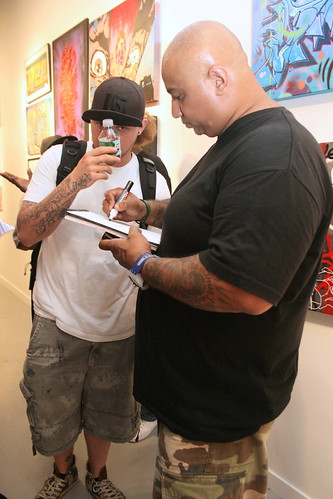Aight New Yorkers, ya'll know graffiti when you see it with tags and characters. This exhibit at Benrimon Contemporary takes the appreciation and beauty of its work to a new level. The work will be up until August 10, 2010.
Now when I walked outside after viewing the show, there was a couple that asked me about what exhibit was being shown. I tried to sell it but not everyone understands or wants to appreciate graffiti. Whether you think you do or not, there is no harm in checking it out. Either you will gain an appreciation you didn't have before or be further impressed with the kind of work that can be done with an aerosol can.
When I visited the gallery, I had a chance to talk with curator Mario Ramos. He along with Claudia Bumbas are owners of 1HUNDREDB, a LES storefront that serves the urban art culture.
Featured are pieces by PNUT, Cap1, Stayhigh149, Noc167, Richard Hambleton among others with tribute to Keith Haring and Jean-Michel Basquiat. Stayhigh149 has a NYPD ticket dated 1969 proving that he is one of the founders of bringing street art to the masses.
On their blog http://1hundredb.blogspot.com/ or flickr page http://www.flickr.com/photos/1hundredb they also have pics from opening night with the numerous artists it includes. I included an example where it looks like the event was a nice chance for the artists to show appreciation for each others work and for fans to meet in person the mysterious artists who's work they've only seen on the streets.
Mario is an awesome guy and this is an awesome show. When I walked in 2 days after the opening (which had over 1,000 people) , I could still smell the fresh paint from a live installation (subways doors included ;)) done on one of the gallery walls. He pointed out that while looking at the tags on the mural, it may look like a mess at first, the taggers respect each other's space. If by accident someone writes over someone else's tag, the offender would write "Sorry" to the other person..
We talked about how the form of art has become one more thing to issue fines or jail times for. Some parts of Europe are turning into what NY was in the 70s and 80s, as NY artists seek places around the world to express themselves.
Artists now are now using stickers to leave their mark.
Now advertisers are leaving their mark on the subways. $$$$$$$$$$ (To the MTA that if given all the money they would need to get out of their convenient deficit, would still have NO IDEA how to manage their money. Honestly I feel if business students took on the MTA finances, they would have it solved in a semester)....but anyway.


